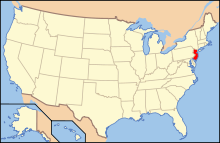LGBTQ rights in New Jersey | |
|---|---|
 | |
| Status | Legal since 1978 |
| Gender identity | Transgender people allowed to change legal gender |
| Discrimination protections | Sexual orientation and gender identity protections (see below) |
| Family rights | |
| Recognition of relationships | Civil unions since 2007; Same-sex marriage since 2013 |
| Adoption | Same-sex couples may adopt jointly |
Lesbian, gay, bisexual, transgender, and queer (LGBTQ) people in the U.S. state of New Jersey have the same legal rights as non-LGBTQ people. LGBT individuals in New Jersey enjoy strong protections from discrimination, and have had the same marriage rights as heterosexual people since October 21, 2013.
Since the late 1960s, state-sanctioned discrimination against LGBTQ people has become increasingly less acceptable. A series of court decisions have enlarged the areas of LGBT rights. LGBTQ people were allowed to gather in drinking establishments in 1967 and allowed to have intimate relationships in 1978. Anti-gay adoption policies by New Jersey's state welfare agency were dropped in 1997. The New Jersey Law Against Discrimination, amended to include sexual orientation and gender identity in 1991 and 2006, prohibits discrimination in employment, housing, and public accommodations. Criminal law deters bias-motivated crimes against LGBT individuals, and New Jersey schools are required to adopt anti-bullying measures that address LGBT students. In August 2013, Governor Chris Christie signed a bill into law prohibiting mental health providers from providing so-called "conversion therapy" to LGBT minors.
New Jersey is frequently referred to as one of the United States' most LGBTQ-friendly states,[1][2] with several gay establishments and venues throughout the state, notably in Jersey City, Asbury Park, Maplewood, Atlantic City, Ocean Grove, Edison, and Cape May among others.[3] Opinion polls have shown very high levels of support for same-sex marriage.[4]
- ^ "The best and worst states for LGBT equality". MSNBC. Archived from the original on July 10, 2018. Retrieved October 14, 2018.
- ^ Theil, Michele (February 2, 2024). "Groundbreaking map shows which US states are the least safe for LGBTQ+ people". PinkNews. Retrieved February 2, 2024.
- ^ Where are the most LGBTQ-friendly towns in N.J.?
- ^ Cite error: The named reference
prri2022was invoked but never defined (see the help page).